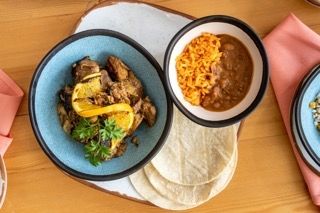Choose best mexican westchester NY spots for mouthwatering cuisine
Wiki Article
Is Mexican Food Healthy? Unloading the Nutritional Perks of Standard Active Ingredients
The concern of whether Mexican food is healthy invites an exploration of its traditional components. Beans and corn act as foundational staples, rich in protein and fiber. Avocados offer advantageous fats, while different natural herbs and seasonings include taste and health advantages - mexican food. Together, these elements create a tapestry of nutrition. The healthfulness of Mexican cuisine typically depends on preparation methods and section sizes. What duty do these variables play in establishing its overall dietary worth?The Power of Beans: Healthy Protein and Fiber-Rich Staples
Although frequently ignored, beans act as a keystone of Mexican food, offering a wealth of dietary advantages. Rich in protein, they are an exceptional plant-based option for those seeking to meet their dietary healthy protein requires. This high protein material supports muscle mass repair work and development, making beans invaluable for both vegetarians and meat-eaters alike. Furthermore, beans are an outstanding source of dietary fiber, which helps in digestion and advertises a sensation of volume, possibly aiding with weight management.The range of beans used in Mexican dishes, such as black beans, pinto beans, and kidney beans, adds to a varied taste account and can enhance meals nutritionally. Beans are low in fat and contain crucial vitamins and minerals, including folate, magnesium, and iron. With each other, these characteristics make beans a crucial component, delivering both nourishment and food in standard Mexican price.

Corn: a Versatile Grain With Nutritional Advantages
Corn attracts attention as a versatile grain basic to Mexican cuisine, commemorated not only for its cooking applications yet likewise for its impressive nutritional account. As a primary active ingredient in meals like tortillas, tamales, and pozole, corn provides important nutrients that add to a well balanced diet plan. Rich in carbohydrates, it acts as a significant energy source, while also being low in fat, making it a desirable choice for different nutritional needs.Corn is a good source of dietary fiber, which helps in food digestion and promotes satiety. It contains significant amounts of vitamins such as B-complex vitamins, which are essential for basal metabolism. The presence of anti-oxidants, particularly carotenoids, contributes to total wellness by lowering oxidative tension. Additionally, corn is gluten-free, catering to those with gluten level of sensitivities. Generally, the nutritional benefits of corn emphasize its significance in typical Mexican food and its function in a healthy and balanced diet.
Avocados: Healthy Fats and Nutrients in Every Bite
Avocados play a considerable duty in Mexican food, complementing meals with their luscious structure and rich taste. Past their cooking appeal, avocados are celebrated for their remarkable nutritional profile. They are an abundant source of healthy and balanced monounsaturated fats, which can aid lower bad cholesterol levels and support heart health and wellness. Additionally, avocados are loaded with important vitamins and minerals, including potassium, vitamin E, and B vitamins, adding to general health.The high fiber material in avocados help digestion and advertises satiation, making them a useful enhancement to any kind of dish. Their distinct nutrient make-up can likewise support skin wellness and offer anti-inflammatory benefits. Integrating avocados into conventional Mexican recipes or enjoying them as a standalone snack can boost both taste and nutrition, demonstrating why they are a precious staple in Mexican cuisine. On the whole, avocados use a scrumptious means to enjoy healthy and balanced fats and critical nutrients in every bite.

Seasonings and Herbs: Flavorful Wellness Boosters
While delighting in the rich tastes of Mexican food, one can not forget the vital duty that spices and herbs play in improving both taste and health. Components such as cilantro, oregano, and chili peppers not only add to the vibrant flavor profile yet additionally provide significant health and wellness benefits. As an example, cilantro is known for its detoxifying residential or commercial properties, aiding to eliminate hefty steels from the body, while oregano is packed with antioxidants and possesses anti-inflammatory effects.Chili peppers, a staple in lots of Mexican recipes, consist of capsaicin, which has actually been linked to enhanced metabolic rate and discomfort relief. Furthermore, spices like cumin and coriander assistance digestion and might aid in blood sugar level policy. Incorporating these delicious health boosters right into meals not only boosts the culinary experience but also advertises overall wellness, making Mexican food not simply tasty, however additionally nutritionally helpful.
Standard Cooking Methods: Enhancing Nutrition and Taste
Standard cooking methods in Mexican cuisine play a necessary function in boosting both nutrition and taste, as they usually focus on fresh ingredients and classic strategies. Methods such as nixtamalization, where corn is saturated and cooked in an alkaline service, not just boost the nutrient profile of tortillas yet also enhance their digestibility - lunch and dinner. Additionally, the use of sluggish cooking methods, like stewing or braising, enables tastes to combine perfectly while keeping the integrity of the active ingredients
Frequently Asked Questions
Are Mexican Food Portions Typically Larger Than Various Other Cuisines?
Mexican food sections are commonly larger than those of many various other foods. This characteristic reflects traditional dining techniques, highlighting communal sharing and hearty dishes, which can lead to a much more considerable offering size overall.
How Does the Prep Work Technique Affect Healthfulness of Mexican Food?
Preparation methods significantly affect the healthiness of Mexican food. Strategies such as barbecuing or steaming maintain nutrients, while frying can enhance undesirable fat web content. Choices of active ingredients and cooking designs ultimately establish overall nutritional worth.Can Mexican Food Be Tailored for Certain Dietary Limitations?
Mexican food can without a doubt be customized for details dietary constraints. Alternatives, such as making use of corn tortillas for gluten-free diet plans or including more vegetables, allow individuals to enjoy standard flavors while suiting various nutritional requirements.What Prevail False Impressions Regarding Mexican Food and Wellness?
Common mistaken beliefs about Mexican food consist of the belief that it is inherently undesirable, excessively hot, and solely focused on fats. Actually, conventional dishes usually feature nourishing components and can be tailored to different nutritional demands.Are There Much Healthier Options at Mexican Dining Establishments?
Much healthier choices at Mexican dining establishments usually consist of barbequed meats, beans, and fresh vegetables. Choosing dishes that stress entire ingredients and avoiding heavy sauces can result in a much more healthy dining experience, advertising overall well-being.The range of beans used in Mexican meals, such as black beans, pinto beans, and kidney beans, contributes to a varied flavor account and can enhance meals nutritionally. Avocados play a significant duty in Mexican cuisine, matching meals with their creamy texture and rich taste. Including hand crafted margarita avocados into traditional Mexican dishes or enjoying them as a standalone snack can boost both taste and nourishment, showing why they are a cherished staple in Mexican food. While appreciating the rich tastes of Mexican cuisine, one can not overlook the necessary function that spices and natural herbs play in boosting both preference and health. Typical food preparation methods in Mexican cuisine play an essential role in boosting both nourishment and flavor, as they typically focus on time-honored techniques and fresh ingredients.
Report this wiki page